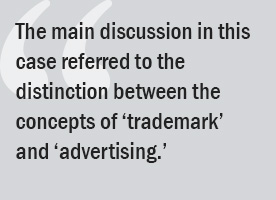INTA News
International Amicus Committee Update: INTA Calls on Chilean Court to Uphold Trademark Protections
Published: October 1, 2019
Néstor Morera San José, Costa Rica International Amicus Committee, Latin America Amicus Subcommittee
 Latin America Amicus Subcommittee, submitted an amicus brief on August 12 in the case of Evercrisp Snack Products de Chile S.A. v. Fisco de Chile, with the purpose of safeguarding the public interest involved in the due protection of trademarks and the public’s right to the proper identification of the products and services in the market.
Latin America Amicus Subcommittee, submitted an amicus brief on August 12 in the case of Evercrisp Snack Products de Chile S.A. v. Fisco de Chile, with the purpose of safeguarding the public interest involved in the due protection of trademarks and the public’s right to the proper identification of the products and services in the market.
This project was undertaken with the view that INTA’s members share the goal of promoting and understanding the fundamental role that trademarks and related intellectual property rights play in the effective acceptance of commerce, fair competition, and consumer decision-making and in view of the fact that this trial is pending the joint hearing of the appeal in cassation.
Background
By means of Law 20.606, the Chilean government (with the corroboration and monitoring of the Health Authority) requires the labeling of certain products that contain a large amount of “calories, fats, sugars, salt or other ingredients,” and also sets limits on the nutritional content for certain products. This law also prohibits the sale, commercialization, promotion, and advertising of the mentioned products in nursery schools and primary and secondary educational institutions.
Within the framework of implementing these regulations, on April 24, 2017, the Chilean Regional Ministerial Secretary’s Office of Health (SEREMI) issued Resolution No. 3000 imposing sanctions on EVERCRISP SNACK PRODUCTOS DE CHILE S.A. (Evercrisp) due to what authorities deemed “advertising,” derived from the use of registered trademarks CHEETOS and GATOLATE owned by Evercrisp, consisting of two well-known animal images on the package of the products.
Evercrisp filed a lawsuit against SEREMI’S resolution, which the Second Civil Court of Santiago rejected on May 30, 2018, maintaining the sanctions previously imposed. The main discussion in this case referred to the distinction between the concepts of “trademark” and “advertising” as contended by Evercrisp. The proper clarification of each of these concepts remains essential for a legal and fair decision on the still present controversy. In this case, the Chilean authorities’ decisions confused the “use of the trademark” with the “advertising of a trademark.”
The use of a trademark on the packaging of the products is only intended to identify a product with its business origin and differentiate it from other products of the same type. This however, has nothing to do with the advertising effect that is limited by means of Law 20.606, and understood as the means through which information is disseminated or made public, regardless of its nature.
In this regard, it is evident then that the means (advertising) should not be confused with the object (“the products or services that are identified and/or related to a business organization by means of trademarks”).
The confusing advertising itself or the advertising use of trademarks with the commercial use of the trademarks in the identification of goods, undoubtedly infringes the rights of figurative or mixed trademarks that the holders have been granted, since the decision contained in the final judgment directly hinders the right to use of the GATOLATE and CHEETOS trademarks owned by Pepsico, Inc.
Most of the distinctiveness of a trademark’s logo or figurative elements lies in its attractiveness. Distinctiveness is not only a substantive requirement that every trademark must meet, but a desirable characteristic aimed at the fulfillment of its primary function in the market. Consequently, restrictive measures against the attractiveness of a brand or logo could only result in a denaturalization of the trademark and its purpose, regardless of the consumer to which it is directed. On the other hand, regarding the function of consumer protection, the natural relationship between the public and the trademark holder cannot be prejudiced by the prohibition of the direct trademark use in the identification of the goods. Therefore, the decision of the Second Civil Court of Santiago adversely affects the rights of the consumers to a free choice or selection.
INTA’s Brief: A Call to Uphold Trademark Protections
For these reasons, INTA has requested the court to overturn resolution No. 3000 in favor of upholding the current trademark laws and declare the following:
- Both resolutions should make an extensive interpretation towards trademarks, applicable exclusively with regards to advertising of products.
- It is contrary to the regulatory and legal regulations insofar as it considers the concepts of “trademark” and “advertising” to coincide, despite the fact that various regulatory and legal provisions establish clear differences between the two concepts.
- The challenged decisions are unconstitutional because, by confusing the concepts of trademark and advertising, they create a judicial prohibition on the use of trademarks as granted, completely alien to the domain limitations admitted by law.
- At an international level, there is no agreement, regulation, or recommendation that recognizes an advertising element as part of the essence of a trademark. On the contrary, where “advertising” or “promotion” is mentioned, it is clearly distinguishable from the genuine use of a trademark.
- In binding international agreements and comparative case law, the concepts of trademark use and advertising are different from the ones applied by the Chilean health authorities in the challenged decisions.
Although every effort has been made to verify the accuracy of items in the INTA Bulletin, readers are urged to check independently on matters of specific concern or interest.
© 2019 International Trademark Association